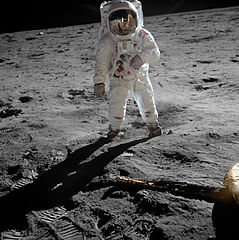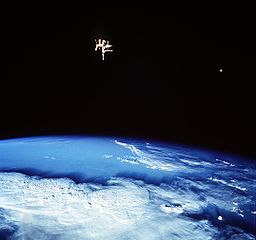
|
Flamsteed Astronomy Society |
|
‘The Psychology and Physiology of Space Travel in Humans’ by Prof Nick Kanas MD - March 16, 2012 |
|
page 1 of 3 |

|
Report by Chris Sutcliffe The Flamsteed were in the unusual position of having a Friday evening lecture, rather than our usual Monday evening slot. This was so that we could welcome back Nick Kanas, who made a stop off in London to visit us, on his way home from Paris to San Francisco. Nick is professor of psychiatry at the University of California, San Franscisco. He also works alongside NASA researching the effects of space travel on astronauts, and has written a book on 'Space Psychology and Psychiatry'. PSYCHOLOGICAL ISSUES OF SPACE TRAVEL Nick detailed a number of psychological issues resulting from space travel, including adjustment disorders, somatoform disorders (these are characterised by physical disorders which are symptoms of medical problems), mood and thought disorders, post mission adaptation and asthenization (neurasthenia). Many astronauts have ended up with depression having been separated from families, and have also had to adapt to fame and glory. In the 1960s, when submarine crews were separated from their families for long periods, their wives became used to the separation, resulting in depression when the men returned. Asthenization is characterised by physical and emotional fatigue or weakness, hypoactivity, irritability and tension, appetite and sleeping problems, as well as attention and memory deficits and withdrawal from others. More than 50% of cosmonauts experience this, but psychological support is helpful in orbit. PHYSIOLOGICAL EFFECTS OF MICROGRAVITY Nick described the physiological effects of space travel, which mainly occur as a result of microgravity. Blood and fluids shift to the upper part of the body, there are atrophic changes in selective muscles, a decrease in gastric emptying, reduced intestinal absorption rates and an effect on the liver. PSYCHOLOGICAL STUDIES Studies of US and Russian crews on the Shuttle / Mir missions and the International Space Station have been conducted, with personnel completing questionnaires. The studies found that interpersonal issues arose between crew members over time, but ground support and supply ships helped to boost morale and provide extra stimulation. Tension builds if there is a perceived lack of support from the ground. There are also cultural differences. Russian crews displayed higher tension levels, but US crews had a higher work pressure (possibly resulting from an abundance of paperwork). In contrast, the Russians had a more “seat of pants” approach and no fancy gadgets.
Continued/ |

|
Prof Nick Kanas [Pic Grey Lipley] |


|
Buzz Aldrin may have suffered from asthenization after his return from the Moon on Apollo 11. |

|
Studies of the Mir and ISS missions have provided valuable insights into the psychological effects of space travel. |